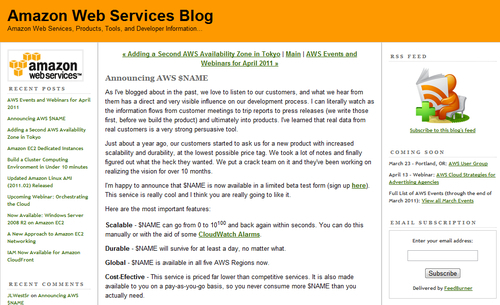So these are a few of the strategic goals that successful business blogs aspire to. They provide you with one method of analyzing your blog (and the blogs of others).
But we can also look at blogs in terms of their type. Looking around the blogosphere, we see many types or styles of blog. Each of these types of blog is likely to have its own set of strategic goals. By understanding what your strategic goals are, you can probably determine what type of blog you should have. We can measure the success of a blog by looking at its type and deciding whether it achieves the strategic goals for that particular blog type.
These tend to simply focus on a company's product(s). They provide information on research and development, product features, user guides, where to buy, and anything else directly related to the product or service. They are usually regarded as a straightforward sales channel—their purpose is to close sales. The strategic goals that these blogs are trying to achieve are usually to increase sales and add value.
A great example of a product blog is the Amazon Web Services Blog, which the company uses to tell its customers about newly developed products and services (http://aws.typepad.com/aws/).

This is probably the most diverse type of blog as it can fulfill many, if not all, of the strategic goals we highlighted previously. The corporate blog can take many forms and has many purposes.
These are at once the easiest kind of business blog to get started and the easiest to get wrong because remaining focused can be a challenge. They provide almost a completely blank canvas, so it's important to identify the strategic goals and stick to them.
General corporate blogs are probably the most common type of business blogs to be found on the web. They provide a great deal of flexibility and can cover a diverse range of subject matters.
If you have several strategic goals in mind for your blog, you will most likely end up with a general corporate blog. A great example of this type of blog, built using WordPress, is Flickr (http://blog.flickr.com/en).

These are a slightly different type of blog as they can be a business in their own right.
They usually provide news coverage for a specific niche and may be run by an expert in that field or a team of experts. Many of the most popular blogs on the web take this form. A lot of these focus on internet and digital technologies. They are almost like online magazines or newspapers.
Because of the high traffic that these types of blogs can attract, many have become successful independent media businesses by raising revenue from advertising sales and corporate sponsorships.
In terms of the strategic goals behind this type of blog, it tends to show expertise and adding personality. However, as many of these are businesses in their own right, they also have the goal of increasing sales, that is, advertising sales.
Some notable blogs in this category are TechCrunch (http://www.techcrunch.com/), GigaOM (http://gigaom.com/), and Mashable (http://mashable.com/), all of which use WordPress.

These are written by pundits or experts in their field. They are usually aimed at promoting the business activity of the author. The experts behind these blogs may be freelance consultants, professional speakers, authors, or they may run their own companies.
Again, many of the most popular blogs on the web are of this type. Some expert bloggers derive a good income simply from running their blogs—they can monetize the high traffic they receive by selling advertising space.
The strategic goals behind these blogs are usually raising awareness of the expert's business activities, demonstrating knowledge and expertise, and driving traffic to the expert's other websites.
Expert blogs can also come under the auspices of large corporations who use the reputation of some of their senior employees to improve their company profile.
Some expert blogs have a long history coming directly from the tradition of the 'personal home page', which was instrumental in the development of blogging. Famous expert bloggers include Seth Godin (http://sethgodin.typepad.com/), Robert Scoble (http://www.scobleizer.com/), and Guy Kawasaki (http://blog.guykawasaki.com/ — shown in the following screenshot).

These are just four, rather broad categories. It's easy to see that many blogs will fit into one or another of these types, but some blogs cross over and there are certainly other types of blogs that we haven't covered. The main point to understand is that having a clear idea of the type of blog you want to achieve, based on your strategic goals, is an important first step in making your blog a success.



